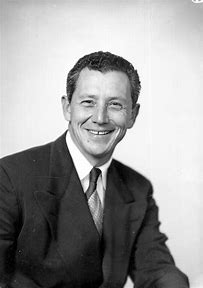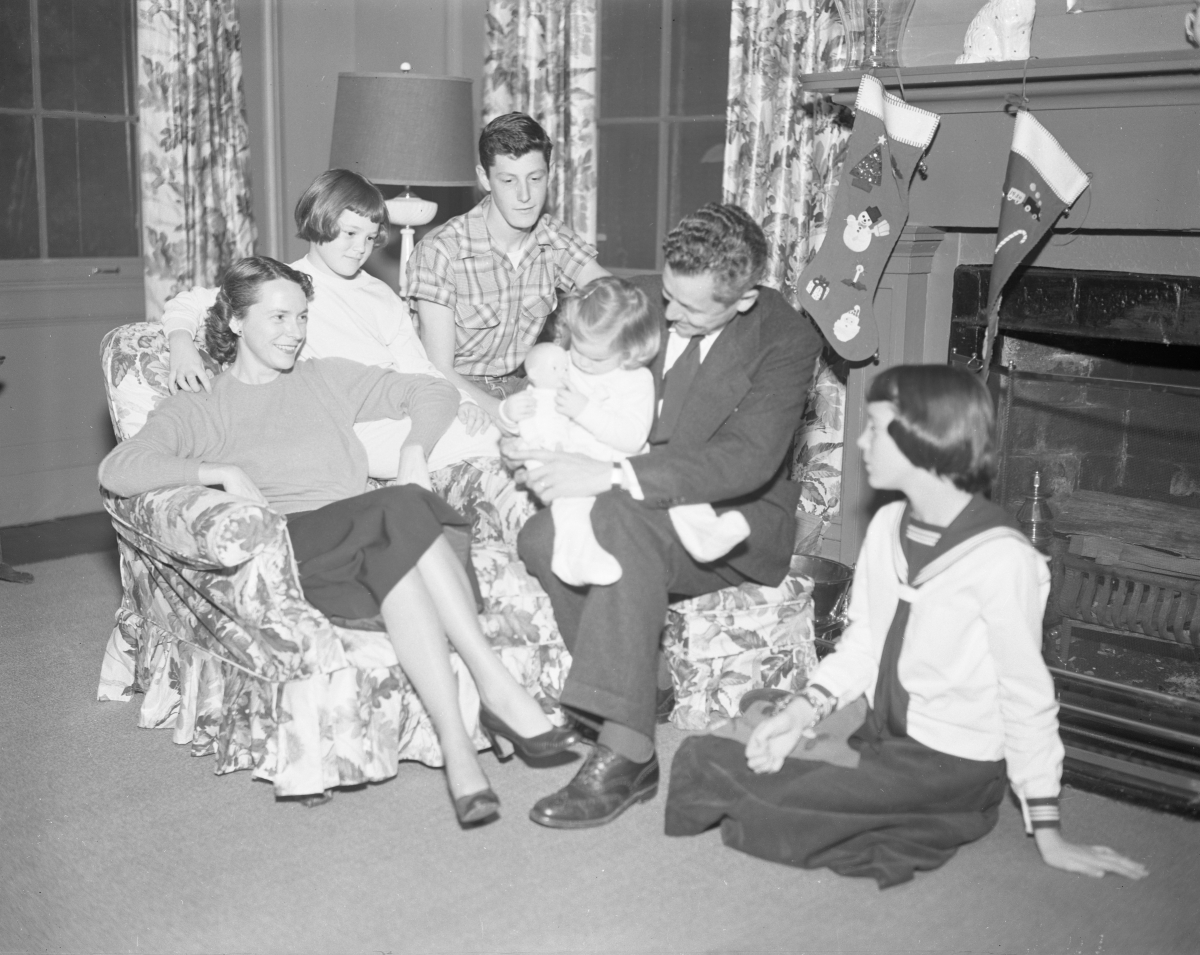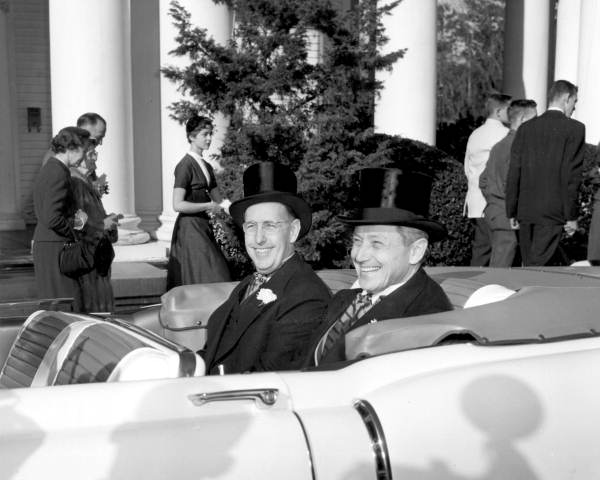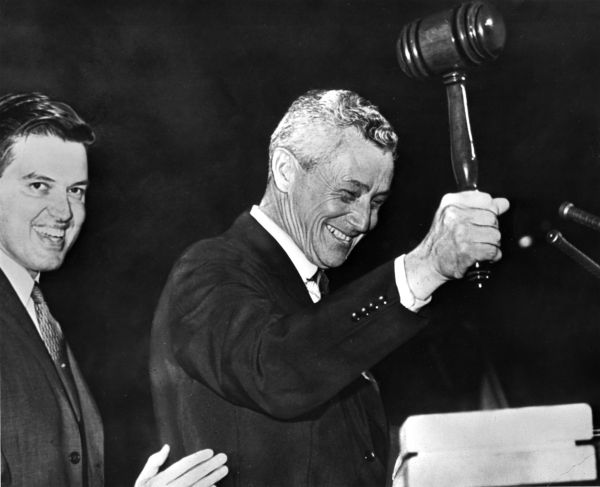 Portrait of LeRoy Collins. 1946-10-04
Portrait of LeRoy Collins. 1946-10-04
(State Archives of Florida/Slade)
1909 Born in Tallahassee, Florida, on March 10, LeRoy Collins is one of six children of Marvin, a grocer, and Mattie (Brandon) Collins.
1927 LeRoy Collins, elected class president during his senior year, graduates from Leon High School.
1931 Collins completes his law studies at Cumberland University in Tennessee.
1932 Mary Call Darby, great-granddaughter of Richard Keith Call (twice Governor of Florida) and LeRoy Collins are married. The same year, Collins is narrowly defeated in his bid for Leon County Prosecutor.
1934 - 1940 Elected at age 25, Collins serves in the state House of Representatives. He sponsors legislation for the statewide retirement system for teachers, for the first code to modernize the Florida school system, and for funding the education of children with disabilities. He fights to outlaw slot machines - which were meant to add funding for educational reform.
1940 Collins is elected to the State Senate to finish out the term of William Hodges, who died in office. He serves until 1944, when he resigned to join the Navy in World War II.
 Collins family enjoying Christmas at The Grove in Tallahassee. 1951 (circa)
Collins family enjoying Christmas at The Grove in Tallahassee. 1951 (circa)
(State Archives of Florida/Dixon)
1941 The Collins family acquires their home, The Grove, built by Richard Keith Call in the 1820's across the street from the Governor's Mansion in downtown Tallahassee. They raise their four children there.
1946 Re-elected to the state Senate, Collins is becoming known for his work in the areas of women's rights, education, highway safety, and labor, health, and welfare.
1947 Collins is selected "Most Valuable Senator" by the Capital Press Corps.
1953 Collins is voted "Most Valuable Senator," "Most Valuable All-Around Member," and "Outstanding in Debate," by Senate colleagues in the "Cracker Politics" poll.
 Acting Governor Charley E. Johns and Governor-elect LeRoy Collins leaving mansion for capitol. 1955-01-04
Acting Governor Charley E. Johns and Governor-elect LeRoy Collins leaving mansion for capitol. 1955-01-04
(State Archives of Florida)
1954 Collins defeats Charley Johns (acting as governor for Dan McCarty, who died in office) to become Florida's 33rd governor. Collins was the first Florida governor elected to consecutive terms.
1955 Collins becomes known as "the education Governor." He gives Florida its system of community colleges, three new state University, statewide educational TV, and instituted merit pay for teachers.
1956 Collins is reelected as governor. The Tallahassee bus boycott is is taking place and the Governor takes a moderate position on racial issues. He is known for his work on desegregation in the South, and his work towards state reapportionment during this time. He strongly supports the "one man, one vote" principle.
1957 The Governor becomes known nationally as a "spokesman of the New South" for his open-minded attitude towards integration. He becomes chairman of the Southern Governors Conference in spite of the fact that some members disagree with his ideas on education, reapportionment, and integration.
1958 Collins becomes the chairman of the National Governors Conference. He is the first governor to serve as chairman of the National and Southern Governors Conferences simultaneously.
1959 As the chairman of the National Governors Conference, Collins leads a delegation on a visit to the Soviet Union to compare how states and republics in two countries are governed.
 Governor Collins banging a gavel at the Democratic National Convention. 1959
Governor Collins banging a gavel at the Democratic National Convention. 1959
(State Archives of Florida)
1960 Collins is elected as permanent chairman to the Democratic National Convention and presides over John F. Kennedy's nomination for the Democratic presidential candidate.
1961 After serving the maximum two terms, Collins retires as Governor. He takes a position as the president of the National Association of Broadcasters and calls for a ban on televised cigarette advertisements.
1964 Collins becomes director of Community Relations Services, which was created as part of the Civil Rights Act of 1964.
1965 President Lyndon Johnson asks Collins to go to the civil rights march led by Martin Luther King, Jr. in Selma, Alabama. He is a major force in insuring a peaceful demonstration without violence against King and his supporters. Collins becomes the undersecretary of the U.S. Department of Commerce.
1966 Collins returns to Florida to join a law firm in Tampa.
1968 Collins runs for the U.S. Senate seat, but is defeated by Ed Gurney.
1970 Collins returns home to Tallahassee to live in The Grove; joins a local law firm, and writes the book, Forerunner Courageous.
1978 Collins serves on the Florida Constitution Revision Commission. Collins unsuccessfully attempts to have the Commission recommend the abolition of the death penalty.
Gov. LeRoy Collins on Civil Rights. 1980-05-22
(State Archives of Florida)
1989 Governor Collins receives the first James D. Westcott Distinguished Service Medal from FSU President Bernard Sliger.
1991 Governor LeRoy Collins died in Tallahassee, Florida, on March 12, 1991 at age 82. He is buried in the family cemetery at The Grove.
1993 On September 17, 1993, the Leon County Public Library was renamed the LeRoy Collins Leon County Public Library.
1998 Governor Collins was selected as one of The Top 50 Most Important Floridians of the 20th Century.